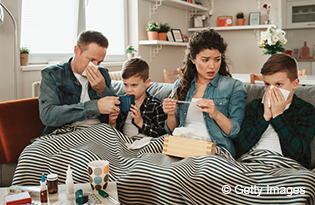Coping with the common cold
12/23/2024 by Fahma Mohamed, M.D.

We've all had a common cold—runny nose, sore throat, stuffy nose, feeling unwell, body aches and low-grade fever. Adults may experience two or three colds each year, while it can be more often for young children.
The common cold is:
- NOT like the flu (influenza), which has a sudden onset of severe body aches, high fever, bad headache and cough.
- NOT like COVID-19, which causes symptoms similar to the common cold plus loss of taste or smell, nausea or vomiting, and a dry cough.
- NOT treated with antibiotics even though your mucus changes from clear to thick yellow or green.
Like other viruses, the cold virus enters the body through the nose, eyes or mouth and is spread by droplets in the air. You can also get the cold virus by hand-to-hand contact with someone with a cold or sharing objects others have touched.
Symptoms typically start 1 to 3 days after exposure to the cold virus and can last 7 to 10 days. If you smoke, your symptoms may last longer.
The best way to protect yourself is to reduce your chances of getting the virus by washing your hands, using hand sanitizer, cleaning and disinfecting surfaces and staying away from those who are sick. It is also important to eat well, exercise and rest.
If you do get a cold, you do not need medical care unless your symptoms worsen. If you do get a cold, here are tips to cope:
- Rest and drink lots of liquid.
- Humidify the air.
- Use a saline nasal rinse.
- Adults may take Tylenol or Ibuprofen for pain relief.
- If your child is younger than three months of age, talk to their primary care clinician before administering any medications.
- Do not give Ibuprofen to babies younger than six months or to children who are vomiting.
- Do not give children aspirin.
- Be careful when using over-the-counter decongestants and cough medication, as they have similar active ingredients.
If your fever lasts more than three to five days, or you have chest pain, ear pain, or are coughing up blood or cough so hard that you vomit or pass out, you should contact your care team immediately.
Fahma Mohamed, M.D., is a family medicine physician who practices at Mayo Family Clinic Northeast in Rochester. She lives in Rochester, Minnesota, with her family. She finished her residency at Hennepin County Medical Center. Her interests include preventive medicine, women’s health, chronic disease management and medical education.
